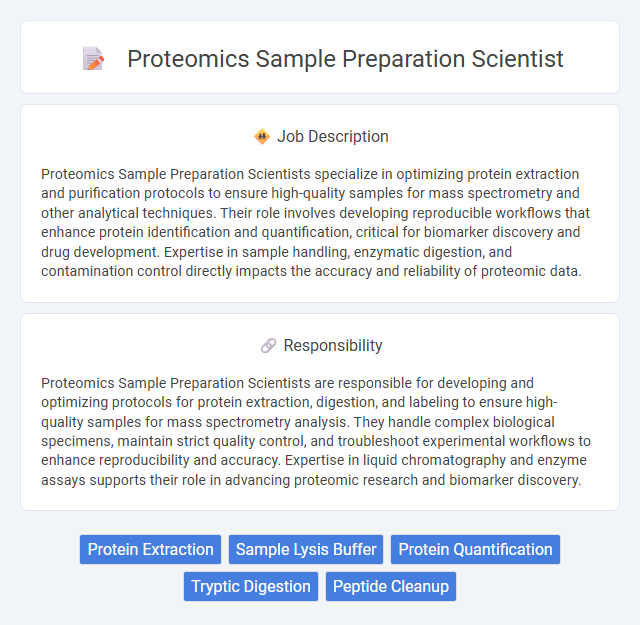
Proteomics Sample Preparation Scientists specialize in optimizing protein extraction and purification protocols to ensure high-quality samples for mass spectrometry and other analytical techniques. Their role involves developing reproducible workflows that enhance protein identification and quantification, critical for biomarker discovery and drug development. Expertise in sample handling, enzymatic digestion, and contamination control directly impacts the accuracy and reliability of proteomic data.
Individuals with strong analytical skills and a background in biochemistry or molecular biology are likely suitable for a Proteomics Sample Preparation Scientist role. Those who thrive in detail-oriented environments and can handle repetitive, precise laboratory tasks may find this position fitting. Candidates who struggle with meticulous sample handling or have limited experience in proteomics protocols might face challenges in this job.
Qualification
A Proteomics Sample Preparation Scientist requires a strong background in biochemistry, molecular biology, or related fields, typically holding a master's or doctoral degree. Essential qualifications include expertise in protein extraction, enzymatic digestion, peptide labeling, and mass spectrometry sample preparation techniques. Proficiency with liquid chromatography and experience with proteomic data analysis software further enhance the candidate's ability to optimize sample workflows and improve data quality.
Responsibility
Proteomics Sample Preparation Scientists are responsible for developing and optimizing protocols for protein extraction, digestion, and labeling to ensure high-quality samples for mass spectrometry analysis. They handle complex biological specimens, maintain strict quality control, and troubleshoot experimental workflows to enhance reproducibility and accuracy. Expertise in liquid chromatography and enzyme assays supports their role in advancing proteomic research and biomarker discovery.
Benefit
A Proteomics Sample Preparation Scientist role likely offers the benefit of working at the forefront of biomedical research, contributing to advancements in disease understanding and drug development. Opportunities for skill enhancement in cutting-edge proteomics technologies and collaboration with multidisciplinary teams may increase career growth potential. Competitive compensation and access to state-of-the-art laboratory resources are probable advantages within this specialized field.
Challenge
Proteomics Sample Preparation Scientists likely face challenges in optimizing protocols to handle diverse biological samples while maintaining protein integrity and reproducibility. Balancing the precision required for high-throughput analysis with the complexity of sample variability could pose significant difficulties. Navigating advancements in technology and integrating novel techniques might also contribute to the demanding nature of the role.
Career Advancement
A Proteomics Sample Preparation Scientist plays a critical role in advancing proteomics research by developing and optimizing sample preparation protocols for mass spectrometry analysis. Mastery in cutting-edge techniques such as protein extraction, digestion, and labeling significantly enhances career opportunities in pharmaceutical, biotechnology, and academic research sectors. Progressing to senior scientist or project lead positions often requires expertise in data integration, experimental design, and proficiency with bioinformatics tools, fostering leadership in proteomic innovation.
Key Terms
Protein Extraction
Proteomics Sample Preparation Scientists specialize in protein extraction techniques to isolate high-quality proteins from complex biological samples, ensuring accurate downstream mass spectrometry analysis. Mastery of methods such as cell lysis, protein precipitation, and detergent-based extraction is essential for maximizing yield and maintaining protein integrity. Expertise in optimizing protocols for diverse sample types accelerates biomarker discovery and advances proteomic research.
Sample Lysis Buffer
Proteomics Sample Preparation Scientists specialize in optimizing sample lysis buffer formulations to efficiently disrupt cellular structures and preserve protein integrity for downstream mass spectrometry analysis. The selection of detergents, chaotropes, and protease inhibitors in the buffer directly influences protein solubilization, extraction yield, and post-lysis stability. Advanced expertise in customizing lysis buffers ensures maximal proteome coverage and reproducible quantitative results critical for high-throughput proteomic workflows.
Protein Quantification
Proteomics Sample Preparation Scientists specialize in precise protein quantification using advanced techniques such as mass spectrometry and label-free quantitation to ensure accurate biomarker identification and validation. They optimize sample preparation protocols, including protein extraction, digestion, and purification, to maximize protein yield and integrity for downstream analysis. Expertise in quantitative proteomics workflows enhances reproducibility and data quality critical for biomolecular research and drug discovery.
Tryptic Digestion
Proteomics Sample Preparation Scientists specialize in optimizing tryptic digestion protocols to enhance protein cleavage efficiency and peptide yield for mass spectrometry analysis. Mastery of enzymatic digestion conditions, including enzyme-to-substrate ratio, incubation time, and temperature, is critical to achieving reproducible proteolytic peptide fragments. Expertise in sample cleanup methods such as solid-phase extraction and desalting is essential to improve downstream MS sensitivity and data quality.
Peptide Cleanup
Proteomics Sample Preparation Scientists specialize in optimizing peptide cleanup protocols to enhance mass spectrometry data quality and reproducibility. Key techniques include solid-phase extraction, desalting, and removal of contaminants such as salts, detergents, and lipids to ensure clean peptide samples for downstream analysis. Mastery of peptide cleanup accelerates accurate protein identification and quantification in complex biological mixtures.
 kuljobs.com
kuljobs.com